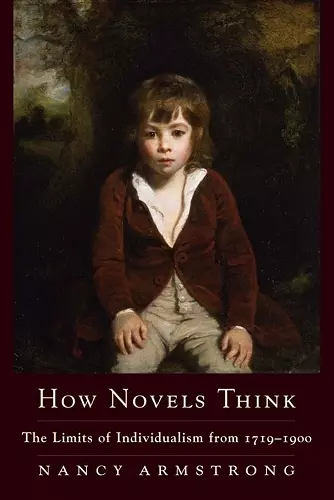How Novels Think
The Limits of Individualism from 1719-1900
Format:Hardback
Publisher:Columbia University Press
Published:17th Feb '06
Currently unavailable, and unfortunately no date known when it will be back

Nancy Armstrong has written a tour de force in which she formulates with breathtaking compactness and clarity a new way of viewing the relationship between the novel and the modern individual. -- John Kucich, University of Michigan, author of The Power of Lies: Transgression in Victorian Fiction In this important new book by one of our most influential scholars of literature, canon formation becomes the central question in the history of the novel. With great lucidity, power, and wit, Armstrong analyzes the logic that binds together the historical form of the novel, its institutionalization in cultural tradition, and the invention of the modern subject. How Novels Think will provoke all students of literature to think in more challenging ways about 'the cultural norms incorporated in the modern individual and reproduced in the nuclear family.' -- Daniel Cottom, University of Oklahoma, author of Cannibals and Philosophers: Bodies of Enlightenment Extending the inquiry of her pathbreaking Desire and Domestic Fiction, Nancy Armstrong's How Novels Think brilliantly explores how novels shifted from making the misfit the protagonist, to disciplining the individualism of women, and imagining the aberrant so as to make readers wish to embody the norm. Treating the individual as the product rather than the source of fiction, Armstrong convincingly explains the role of the Gothic in nineteenth-century realism, as it contends with the contradictions of gender and capitalism. -- Jonathan Culler, Cornell University, author of Structuralist Poetics
Nancy Armstrong argues that the history of the novel and the history of the modern individual are, quite literally, one and the same. She suggests that certain works of fiction created a subject, one displaying wit, will, or energy capable of shifting the social order to grant the exceptional person a place commensurate with his or her individual worth. Once the novel had created this figure, readers understood themselves in terms of a narrative that produced a self-governing subject. In the decades following the revolutions in British North America and France, the major novelists distinguished themselves as authors by questioning the fantasy of a self-made individual. To show how novels by Defoe, Austen, Scott, Bronte, Dickens, Eliot, Hardy, Haggard, and Stoker participated in the process of making, updating, and perpetuating the figure of the individual, Armstrong puts them in dialogue with the writings of Locke, Hume, Rousseau, Malthus, Darwin, Kant, and Freud. Such theorists as Althusser, Balibar, Foucault, and Deleuze help her make the point that the individual was not one but several different figures. The delineation and potential of the modern subject depended as much upon what it had to incorporate as what alternatives it had to keep at bay to address the conflicts raging in and around the British novel.
This volume showcases Armstrong's wide critical imagination and ability... Essential. Choice A compelling and thought-provoking book. -- Miranda El-Rayess Times Literary Supplement
- Winner of Choice Outstanding Academic Title 2006
ISBN: 9780231130585
Dimensions: unknown
Weight: unknown
208 pages